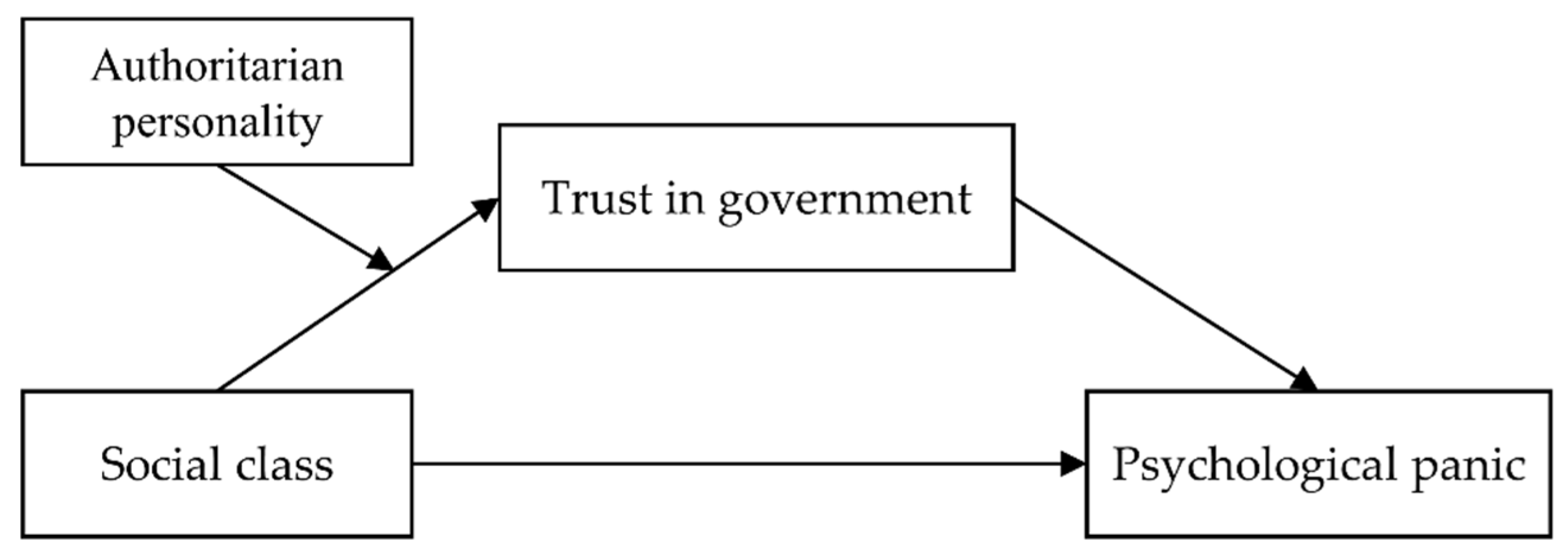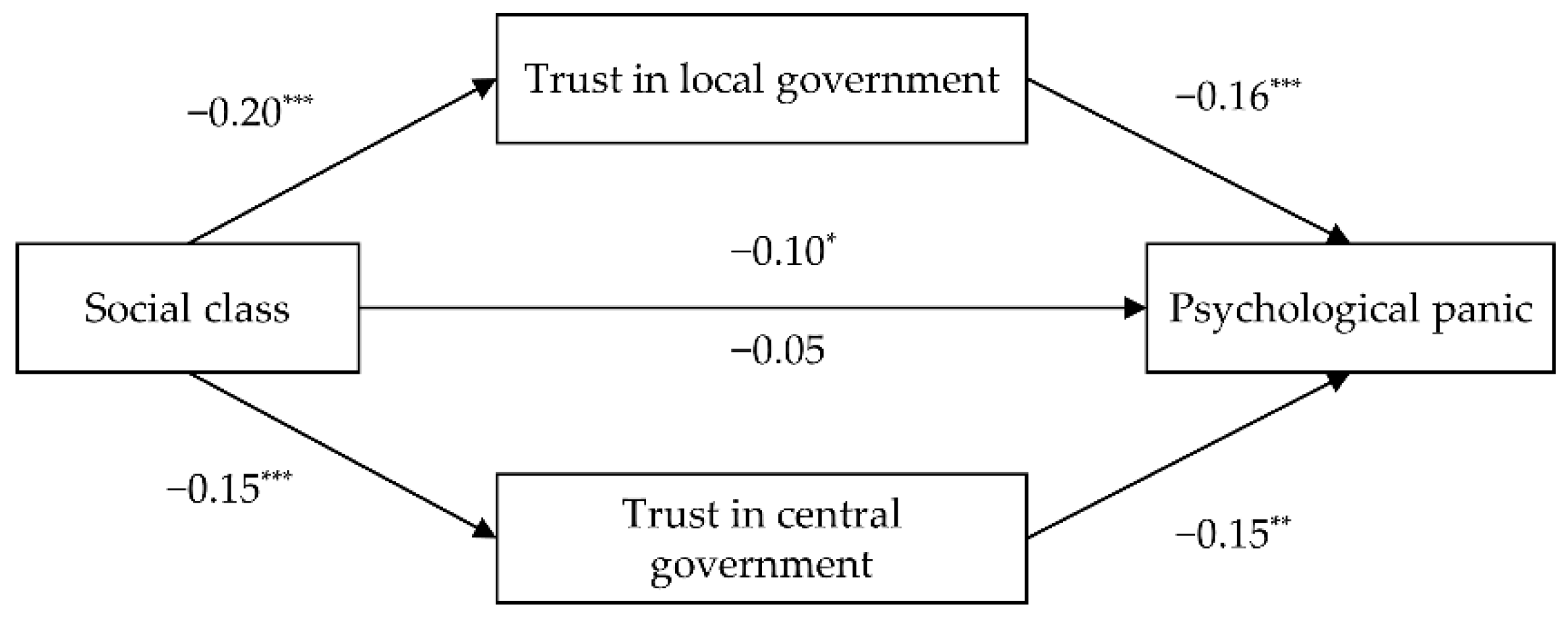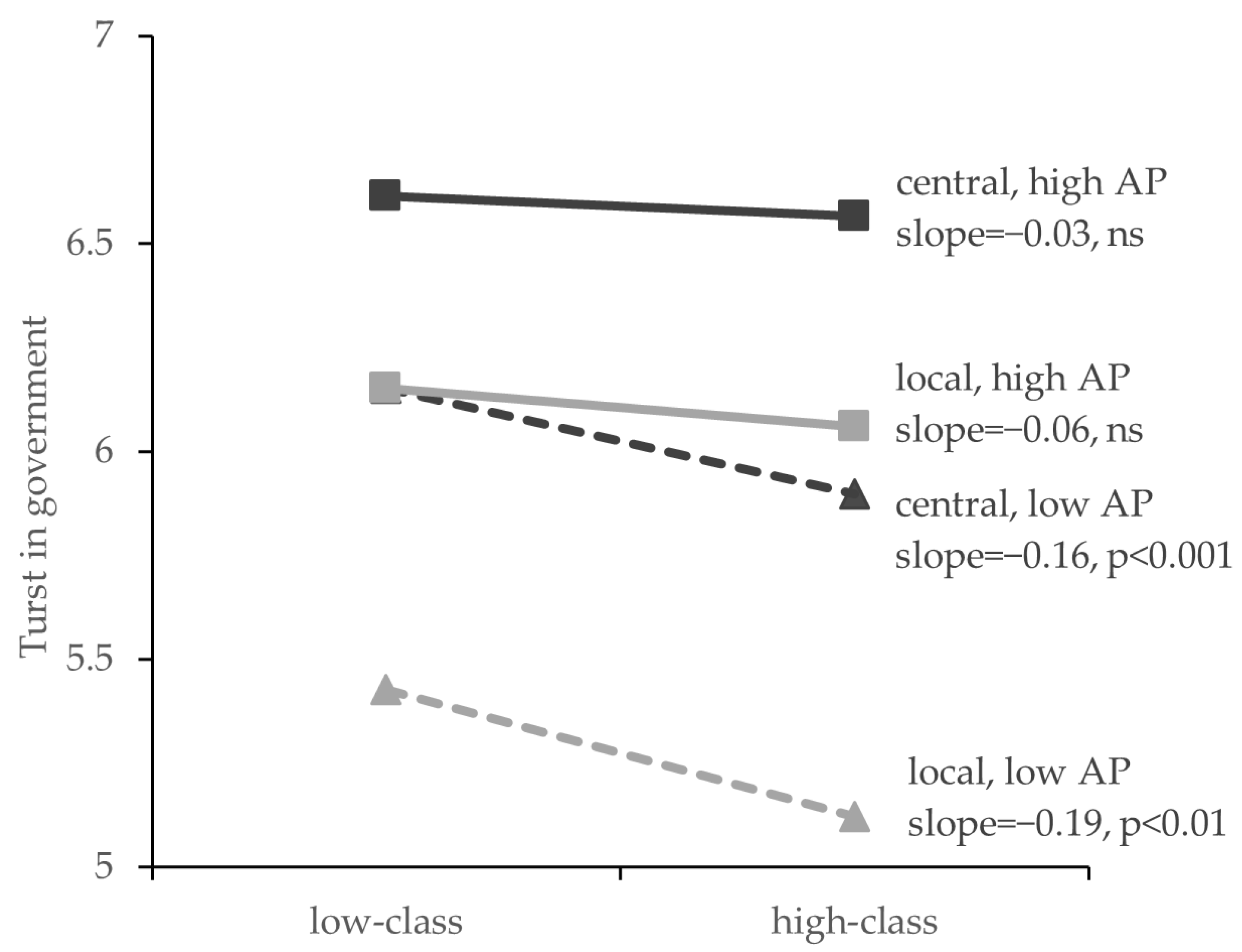Socioeconomic Status and COVID-19-Related Psychological Panic in China: The Role of Trust in Government and Authoritarian Personality
Abstract
:1. Introduction
2. Materials and Methods
2.1. Participants
2.2. Materials
2.2.1. Trust in Government
2.2.2. Socioeconomic Status
2.2.3. Psychological Panic
2.2.4. Authoritarian Personality
2.2.5. Risk Degree and Demographics
3. Results
3.1. Sociodemographic Statistics for Participants
3.2. Preliminary Analyses
3.3. Mediation Analysis
3.4. Moderated Mediation Analysis
4. Discussion
5. Conclusions
Author Contributions
Funding
Institutional Review Board Statement
Informed Consent Statement
Data Availability Statement
Conflicts of Interest
References
- Adhanom Ghebreyesus, T. Addressing Mental Health Needs: An Integral Part of COVID-19 Response. World Psychiatry 2020, 19, 129–130. [Google Scholar] [CrossRef]
- Gorwood, P.; Fiorillo, A. One Year after the COVID-19: What Have We Learnt, What Shall We Do Next? Eur. Psychiatry 2021, 64, e15. [Google Scholar] [CrossRef]
- Unützer, J.; Kimmel, R.J.; Snowden, M. Psychiatry in the Age of COVID-19. World Psychiatry 2020, 19, 130–131. [Google Scholar] [CrossRef] [PubMed]
- Zheng, G.-W.; Siddik, A.B.; Yan, C.; Masukujjaman, M. Official and Unofficial Media Information and the Public Panic during the COVID-19 Pandemic in China: An Empirical Analysis. Rev. Argent. Clínica Psicológica 2020, 29, 1538–1551. [Google Scholar] [CrossRef]
- Pfefferbaum, B.; North, C.S. Mental Health and the COVID-19 Pandemic. N. Engl. J. Med. 2020, 383, 510–512. [Google Scholar] [CrossRef] [PubMed]
- Choi, E.P.H.; Hui, B.P.H.; Wan, E.Y.F. Depression and Anxiety in Hong Kong during COVID-19. Int. J. Environ. Res. Public Health 2020, 17, 3740. [Google Scholar] [CrossRef] [PubMed]
- Nicomedes, C.J.C.; Avila, R.M.A. An Analysis on the Panic during COVID-19 Pandemic through an Online Form. J. Affect. Disord. 2020, 276, 14–22. [Google Scholar] [CrossRef] [PubMed]
- Purnama, S.G.; Susanna, D. Attitude to COVID-19 Prevention with Large-Scale Social Restrictions (PSBB) in Indonesia: Partial Least Squares Structural Equation Modeling. Front. Public Health 2020, 8, 570394. [Google Scholar] [CrossRef] [PubMed]
- Sultana, S.; Shafique, I.; Majeed, N.; Jamshed, S.; Shahani, A.K.; Qureshi, F. Impact of COVID-19 Outbreak on Psychological Health–The Case of Bangladesh. Heliyon 2021, 7, e06772. [Google Scholar] [CrossRef] [PubMed]
- Duong, C.D. The Impact of Fear and Anxiety of COVID-19 on Life Satisfaction: Psychological Distress and Sleep Disturbance as Mediators. Personal. Individ. Differ. 2021, 178, 110869. [Google Scholar] [CrossRef]
- Qian, Y.; Fan, W. Who Loses Income during the COVID-19 Outbreak? Evidence from China. Res. Soc. Stratif. Mobil. 2020, 68, 100522. [Google Scholar] [CrossRef]
- Bambra, C.; Riordan, R.; Ford, J.; Matthews, F. The COVID-19 Pandemic and Health Inequalities. J. Epidemiol. Community Health 2020, 74, 964–968. [Google Scholar] [CrossRef] [PubMed]
- Holst, H.; Fessler, A.; Niehoff, S. COVID-19, Social Class and Work Experience in Germany: Inequalities in Work-Related Health and Economic Risks. Eur. Soc. 2020, 23, S495–S512. [Google Scholar] [CrossRef]
- Jost, J.T. A Quarter Century of System Justification Theory: Questions, Answers, Criticisms, and Societal Applications. Br. J. Soc. Psychol. 2019, 58, 263–314. [Google Scholar] [CrossRef]
- Ma, D.; Yang, F. Authoritarian Orientations and Political Trust in East Asian Societies. East Asia 2014, 31, 323–341. [Google Scholar] [CrossRef]
- Duncan, G.J.; Daly, M.C.; McDonough, P.; Williams, D.R. Optimal Indicators of Socioeconomic Status for Health Research. Am. J. Public Health 2002, 92, 1151–1157. [Google Scholar] [CrossRef]
- Artazcoz, L.; Benach, J.; Borrell, C.; Cortès, I. Unemployment and Mental Health: Understanding the Interactions Among Gender, Family Roles, and Social Class. Am. J. Public Health 2004, 94, 82–88. [Google Scholar] [CrossRef]
- Muntaner, C.; Borrell, C.; Benach, J.; Pasarín, M.I.; Fernandez, E. The Associations of Social Class and Social Stratification with Patterns of General and Mental Health in a Spanish Population. Int. J. Epidemiol. 2003, 32, 950–958. [Google Scholar] [CrossRef] [Green Version]
- Kraus, M.W.; Horberg, E.J.; Goetz, J.L.; Keltner, D. Social Class Rank, Threat Vigilance, and Hostile Reactivity. Pers. Soc. Psychol. Bull. 2011, 37, 1376–1388. [Google Scholar] [CrossRef] [Green Version]
- Lins, S.; Aquino, S. Development and Initial Psychometric Properties of a Panic Buying Scale during COVID-19 Pandemic. Heliyon 2020, 6, e04746. [Google Scholar] [CrossRef]
- Turliuc, M.N.; Candel, O.S. Not All in the Same Boat. Socioeconomic Differences in Marital Stress and Satisfaction During the COVID-19 Pandemic. Front. Psychol. 2021, 12, 635148. [Google Scholar] [CrossRef]
- Pérez-Fuentes, M.D.C.; Herrera-Peco, I.; Jurado, M.D.M.M.; Oropesa, N.F.; Gázquez Linares, J.J. Predictors of Threat from COVID-19: A Cross-Sectional Study in the Spanish Population. J. Clin. Med. 2021, 10, 692. [Google Scholar] [CrossRef] [PubMed]
- Dratva, J.; Zysset, A.; Schlatter, N.; von Wyl, A.; Huber, M.; Volken, T. Swiss University Students’ Risk Perception and General Anxiety during the COVID-19 Pandemic. Int. J. Environ. Res. Public. Health 2020, 17, 7433. [Google Scholar] [CrossRef]
- Li, J.; Jin, X.; Zhao, T.; Ma, T. Conformity Consumer Behavior and External Threats: An Empirical Analysis in China During the COVID-19 Pandemic. SAGE Open 2021. [Google Scholar] [CrossRef]
- van der Toorn, J.; Feinberg, M.; Jost, J.T.; Kay, A.C.; Tyler, T.R.; Willer, R.; Wilmuth, C. A Sense of Powerlessness Fosters System Justification: Implications for the Legitimation of Authority, Hierarchy, and Government: Powerlessness, System Justification, Legitimacy. Polit. Psychol. 2015, 36, 93–110. [Google Scholar] [CrossRef]
- Lalot, F.; Abrams, D.; Travaglino, G.A. Aversion Amplification in the Emerging COVID-19 Pandemic: The Impact of Political Trust and Subjective Uncertainty on Perceived Threat. J. Community Appl. Soc. Psychol. 2021, 31, 213–222. [Google Scholar] [CrossRef]
- Levi, M.; Stoker, L. Political Trust and Trustworthiness. Annu. Rev. Polit. Sci. 2000, 3, 475–507. [Google Scholar] [CrossRef]
- Chen, J. Popular Political Support in Urban China; Stanford University Press: Stanford, CA, USA, 2004; pp. 21–53. [Google Scholar]
- Yang, Q.; Tang, W. Exploring the Sources of Institutional Trust in China: Culture, Mobilization, or Performance? Asian Polit. Policy 2010, 2, 415–436. [Google Scholar] [CrossRef]
- Yang, G.; Zeng, S. The Comparison of Trust Structure between Urban and Rural Residents in China. Am. J. Ind. Bus. Manag. 2016, 6, 665–673. [Google Scholar] [CrossRef] [Green Version]
- Owuamalam, C.K.; Rubin, M.; Spears, R.; Weerabangsa, M.M. Why Do People from Low-Status Groups Support Class Systems That Disadvantage Them? A Test of Two Mainstream Explanations in Malaysia and Australia. J. Soc. Issues 2017, 73, 80–98. [Google Scholar] [CrossRef] [Green Version]
- Jost, J.T.; Pelham, B.W.; Sheldon, O.; Ni Sullivan, B. Social Inequality and the Reduction of Ideological Dissonance on Behalf of the System: Evidence of Enhanced System Justification among the Disadvantaged. Eur. J. Soc. Psychol. 2003, 33, 13–36. [Google Scholar] [CrossRef]
- Kay, A.C.; Gaucher, D.; Napier, J.L.; Callan, M.J.; Laurin, K. God and the Government: Testing a Compensatory Control Mechanism for the Support of External Systems. J. Pers. Soc. Psychol. 2008, 95, 18–35. [Google Scholar] [CrossRef] [PubMed]
- Kay, A.C.; Friesen, J. On Social Stability and Social Change: Understanding When System Justification Does and Does Not Occur. Curr. Dir. Psychol. Sci. 2011, 20, 360–364. [Google Scholar] [CrossRef]
- Jolley, D.; Douglas, K.M.; Sutton, R.M. Blaming a Few Bad Apples to Save a Threatened Barrel: The System-Justifying Function of Conspiracy Theories: System-Justifying Function of Conspiracy Theories. Polit. Psychol. 2017, 39, 465–478. [Google Scholar] [CrossRef]
- Ross, C.E.; Mirowsky, J. Explaining the Social Patterns of Depression: Control and Problem Solving--or Support and Talking? J. Health Soc. Behav. 1989, 30, 206–219. [Google Scholar] [CrossRef]
- Berman, E. The Roles of the State and Federal Governments in a Pandemic. J. Nat’l Sec. L. Pol’y 2020, 11, 61. [Google Scholar]
- Cheung, C.; Tse, J.W. Institutional Trust as a Determinant of Anxiety During the SARS Crisis in Hong Kong. Soc. Work Public Health 2008, 23, 41–54. [Google Scholar] [CrossRef]
- Bacon, A.M.; Corr, P.J. Coronavirus (COVID-19) in the United Kingdom: A Personality-Based Perspective on Concerns and Intention to Self-Isolate. Br. J. Health Psychol. 2020, 25, 839–848. [Google Scholar] [CrossRef]
- Adorno, T.; Frenkel-Brenswik, E.; Levinson, D.J.; Sanford, R.N. The Authoritarian Personality; Verso Books: New York, NY, USA, 2019; pp. xxiii–xl. [Google Scholar]
- Van Hiel, A.; De Clercq, B. Authoritarianism Is Good for You: Right-wing Authoritarianism as a Buffering Factor for Mental Distress. Eur. J. Personal. 2009, 23, 33–50. [Google Scholar] [CrossRef]
- Liu, H.; Raine, J.W. Why Is There Less Public Trust in Local Government Than in Central Government in China? Int. J. Public Adm. 2016, 39, 258–269. [Google Scholar] [CrossRef]
- Shepherd, S.; Kay, A.C. On the Perpetuation of Ignorance: System Dependence, System Justification, and the Motivated Avoidance of Sociopolitical Information. J. Pers. Soc. Psychol. 2012, 102, 264–280. [Google Scholar] [CrossRef] [PubMed] [Green Version]
- Cirino, P.T.; Chin, C.E.; Sevcik, R.A.; Wolf, M.; Lovett, M.; Morris, R.D. Measuring Socioeconomic Status: Reliability and Preliminary Validity for Different Approaches. Assessment 2002, 9, 145–155. [Google Scholar] [CrossRef] [PubMed]
- Xie, Z.; Poon, A.N.; Wu, Z.; Jian, W.; Chan, K.Y. Is Occupation a Good Predictor of Self-Rated Health in China? PLoS ONE 2015, 10, e0125274. [Google Scholar] [CrossRef] [Green Version]
- Côté, S.; Kraus, M.W.; Carpenter, N.C.; Piff, P.K.; Beermann, U.; Keltner, D. Social Affiliation in Same-Class and Cross-Class Interactions. J. Exp. Psychol. Gen. 2017, 146, 269–285. [Google Scholar] [CrossRef]
- Piff, P.K.; Kraus, M.W.; Côté, S.; Cheng, B.H.; Keltner, D. Having Less, Giving More: The Influence of Social Class on Prosocial Behavior. J. Pers. Soc. Psychol. 2010, 99, 771–784. [Google Scholar] [CrossRef] [Green Version]
- Xie, X.; Zheng, R.; Xie, D.; Wang, H. Analysis on Psychological Panic Phenomenon of SARS. Acta Sci. Nat. Univ. Pekin. 2005, 41, 628–639. [Google Scholar] [CrossRef]
- Marteau, T.M.; Bekker, H. The Development of a Six-Item Short-Form of the State Scale of the Spielberger State—Trait Anxiety Inventory (STAI). Br. J. Clin. Psychol. 1992, 31, 301–306. [Google Scholar] [CrossRef]
- Ma, D.; Zhang, Z. The Homogeneity of Public Opinion and Its Psychological Source——An Empirical Analysis Based on a Survey of Chinese Netizens. J. Tsinghua Univ. Soc. Sci. 2017, 32, 174–190. [Google Scholar] [CrossRef]
- Hayes, A.F. Introduction to Mediation, Moderation, and Conditional Process Analysis: A Regression-Based Approach, 2nd ed.; Guilford Publications: New York, NY, USA, 2017; pp. 551–612. [Google Scholar]
- Ding, Y.; Yang, J.; Ji, T.; Guo, Y. Women Suffered More Emotional and Life Distress than Men during the COVID-19 Pandemic: The Role of Pathogen Disgust Sensitivity. Int. J. Environ. Res. Public. Health. 2021, 18, 8539. [Google Scholar] [CrossRef]
- Ainslie, K.E.C.; Walters, C.E.; Fu, H.; Bhatia, S.; Wang, H.; Xi, X.; Baguelin, M.; Bhatt, S.; Boonyasiri, A.; Boyd, O.; et al. Evidence of Initial Success for China Exiting COVID-19 Social Distancing Policy after Achieving Containment. Wellcome Open Res. 2020, 5, 81. [Google Scholar] [CrossRef] [PubMed]
- Rubin, M.; Stuart, R. Kill or Cure? Different Types of Social Class Identification Amplify and Buffer the Relation between Social Class and Mental Health. J. Soc. Psychol. 2018, 158, 236–251. [Google Scholar] [CrossRef] [PubMed] [Green Version]
- Erhardt, J.; Freitag, M.; Filsinger, M.; Wamsler, S. The Emotional Foundations of Political Support: How Fear and Anger Affect Trust in the Government in Times of the COVID-19 Pandemic. Swiss Polit. Sci. Rev. 2021, 27, 339–352. [Google Scholar] [CrossRef]
- Yang, J.; Dong, C.; Chen, Y. Government’s Economic Performance Fosters Trust in Government in China: Assessing the Moderating Effect of Respect for Authority. Soc. Indic. Res. 2021, 154, 545–558. [Google Scholar] [CrossRef]
- Paolini, D.; Maricchiolo, F.; Pacilli, M.G.; Pagliaro, S. COVID-19 Lockdown in Italy: The Role of Social Identification and Social and Political Trust on Well-Being and Distress. Curr. Psychol. 2020. [Google Scholar] [CrossRef]
- Kuzman, M.R.; Curkovic, M.; Wasserman, D. Principles of mental health care during the COVID-19 pandemic. Eur. Psychiatry 2020, 63. [Google Scholar] [CrossRef] [PubMed]
- Ruiz, M.C.; Devonport, T.J.; Chen-Wilson, C.-H. (Josephine); Nicholls, W.; Cagas, J.Y.; Fernandez-Montalvo, J.; Choi, Y.; Robazza, C. A Cross-Cultural Exploratory Study of Health Behaviors and Wellbeing During COVID-19. Front. Psychol. 2021, 11, 3897. [Google Scholar] [CrossRef] [PubMed]



| Variable | Categories | Frequency | Valid Percentages |
|---|---|---|---|
| Gender | Male | 582 | 62.4% |
| Female | 351 | 37.6% | |
| Age | 17–24 | 251 | 26.9% |
| 25–30 | 345 | 37.0% | |
| 31–40 | 236 | 25.3% | |
| 41–50 | 77 | 8.3% | |
| 51–61 | 24 | 2.6% | |
| Educational attainment | Primary school or below | 2 | 0.2% |
| Middle school graduate | 16 | 1.7% | |
| High school graduate or equivalent education completed | 58 | 6.2% | |
| Junior college graduate | 313 | 33.5% | |
| College graduate | 442 | 47.4% | |
| Postgraduate degree | 102 | 10.9% | |
| Average Monthly Income | <CNY 1000 | 52 | 5.6% |
| CNY 1000–CNY 2000 | 51 | 5.5% | |
| CNY 2000–CNY 3000 | 105 | 11.3% | |
| CNY 3000–CNY 5000 | 238 | 25.5% | |
| CNY 5000–CNY 8000 | 235 | 25.2% | |
| CNY 8000–CNY 12,000 | 143 | 15.3% | |
| CNY 12,000–CNY 15,000 | 47 | 5.0% | |
| CNY 15,000–CNY 20,000 | 35 | 3.8% | |
| >CNY 20,000 | 27 | 2.9% |
| M | SD | 1 | 2 | 3 | 4 | 5 | 6 | 7 | 8 | |
|---|---|---|---|---|---|---|---|---|---|---|
| 1. Psychological panic | 4.46 | 1.26 | ||||||||
| 2. Trust in local government | 5.68 | 1.19 | −0.25 ** | |||||||
| 3. Trust in central government | 6.30 | 0.84 | −0.20 ** | 0.56 ** | ||||||
| 4. SES | 0.00 | 0.79 | −0.01 | −0.13 ** | −0.12 ** | |||||
| 5. Authoritarian personality | 4.57 | 1.14 | −0.09 ** | 0.38 ** | 0.37 ** | −0.13 ** | ||||
| 6. Risk degree | 3.81 | 1.44 | 0.32 ** | −0.16 ** | −0.07 * | 0.08 * | −0.07 * | |||
| 7. Age | 30.04 | 8.19 | −0.01 | 0.04 | 0.08 * | 0.15 ** | 0.04 | 0.05 | ||
| 8. Gender | — | — | 0.07 * | −0.09 ** | −0.08 * | −0.05 | −0.15 ** | 0.05 | −0.02 |
| Dependent Variables | ||||||||||||
|---|---|---|---|---|---|---|---|---|---|---|---|---|
| Trust in Local Government | Trust in Central Government | Psychological Panic | ||||||||||
| B | 95%CI | SE | t | B | 95%CI | SE | t | B | 95%CI | SE | t | |
| Independent variable | ||||||||||||
| SES | −0.13 | [−0.22, −0.03] | 0.05 | −2.71 ** | −0.10 | [−0.16, −0.03] | 0.03 | −2.90 ** | −0.10 | [−0.20, −0.01] | 0.05 | −2.08 * |
| AP | 0.36 | [0.30, 0.43] | 0.03 | 11.29 *** | 0.25 | [0.20, 0.30] | 0.02 | 10.78 *** | ||||
| SES × AP | 0.06 | [−0.02, 0.14] | 0.04 | 1.51 | 0.06 | [0.003, 0.11] | 0.03 | 2.06 * | ||||
| Trust in local government | −0.16 | [−0.23, −0.08] | 0.04 | −4.07 *** | ||||||||
| Trust in central government | −0.15 | [−0.26, −0.04] | 0.05 | −2.77 ** | ||||||||
| Covariates | ||||||||||||
| Age | 0.01 | [−0.002, 0.02] | 0.004 | 1.48 | 0.01 | [0.003, 0.02] | 0.003 | 2.77 ** | 0.001 | [−0.01, 0.01] | 0.005 | 0.10 |
| Gender | −0.09 | [−0.24, 0.06] | 0.07 | −1.17 | −0.06 | [−0.16, 0.05] | 0.05 | −1.05 | 0.07 | [−0.09, 0.22] | 0.08 | 0.85 |
| Risk degree | −0.11 | [−0.16, −0.06] | 0.02 | −4.39 *** | −0.02 | [−0.06, 0.01] | 0.02 | −1.39 | 0.26 | [0.20, 0.31] | 0.03 | 9.54 *** |
| Value of Authoritarian Personality | Mediator | |||||
|---|---|---|---|---|---|---|
| Trust in Local Government | Trust in Central Government | |||||
| Indirect Effect | Boot SE | Boot 95%CI | Indirect Effect | Boot SE | Boot 95%CI | |
| −1 SD | 0.031 | 0.01 | [0.01, 0.06] | 0.025 | 0.01 | [0.004, 0.05] |
| M | 0.020 | 0.01 | [0.01, 0.04] | 0.015 | 0.01 | [0.002, 0.03] |
| 1 SD | 0.009 | 0.01 | [−0.01, 0.03] | 0.004 | 0.01 | [−0.01, 0.02] |
Publisher’s Note: MDPI stays neutral with regard to jurisdictional claims in published maps and institutional affiliations. |
© 2021 by the authors. Licensee MDPI, Basel, Switzerland. This article is an open access article distributed under the terms and conditions of the Creative Commons Attribution (CC BY) license (https://creativecommons.org/licenses/by/4.0/).
Share and Cite
Xie, X.; Wu, T.; Zhang, Y.; Guo, Y. Socioeconomic Status and COVID-19-Related Psychological Panic in China: The Role of Trust in Government and Authoritarian Personality. Int. J. Environ. Res. Public Health 2021, 18, 10888. https://doi.org/10.3390/ijerph182010888
Xie X, Wu T, Zhang Y, Guo Y. Socioeconomic Status and COVID-19-Related Psychological Panic in China: The Role of Trust in Government and Authoritarian Personality. International Journal of Environmental Research and Public Health. 2021; 18(20):10888. https://doi.org/10.3390/ijerph182010888
Chicago/Turabian StyleXie, Xiaona, Tingting Wu, Yue Zhang, and Yongyu Guo. 2021. "Socioeconomic Status and COVID-19-Related Psychological Panic in China: The Role of Trust in Government and Authoritarian Personality" International Journal of Environmental Research and Public Health 18, no. 20: 10888. https://doi.org/10.3390/ijerph182010888
APA StyleXie, X., Wu, T., Zhang, Y., & Guo, Y. (2021). Socioeconomic Status and COVID-19-Related Psychological Panic in China: The Role of Trust in Government and Authoritarian Personality. International Journal of Environmental Research and Public Health, 18(20), 10888. https://doi.org/10.3390/ijerph182010888






